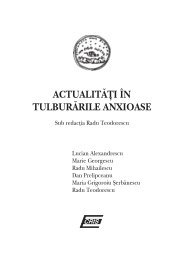- Page 1:
New Europe College Regional Program
- Page 4 and 5:
Editor: Irina Vainovski-Mihai Copyr
- Page 6 and 7:
DENIZ EYLEM YÖRÜK IMPACTS OF INTE
- Page 8 and 9:
Fellowship Programs N.E.C. Yearbook
- Page 10 and 11:
N.E.C. Yearbook 2001-2002 working c
- Page 12 and 13:
N.E.C. Yearbook 2001-2002 Founder o
- Page 15 and 16:
TAMARA CÃRÃUª Born in 1972, in H
- Page 17 and 18:
NATIONAL IDENTITY: INVENTION OR NEC
- Page 19 and 20:
TAMARA CÃRÃUª were not (God) giv
- Page 21 and 22:
TAMARA CÃRÃUª 2. Discourses of n
- Page 23 and 24:
TAMARA CÃRÃUª 2.2 Identity disco
- Page 25 and 26:
TAMARA CÃRÃUª 22 years of the Un
- Page 27 and 28:
TAMARA CÃRÃUª Use of history: Th
- Page 29 and 30:
TAMARA CÃRÃUª When the prospects
- Page 31 and 32:
TAMARA CÃRÃUª of Bolshevik ideas
- Page 33 and 34:
TAMARA CÃRÃUª exorcise nationali
- Page 35 and 36:
TAMARA CÃRÃUª more feasible in a
- Page 37 and 38:
TAMARA CÃRÃUª - Others: de-Russi
- Page 39 and 40:
TAMARA CÃRÃUª There are some ele
- Page 41 and 42:
TAMARA CÃRÃUª support. How can t
- Page 43 and 44:
TAMARA CÃRÃUª firstly, failing t
- Page 45 and 46:
TAMARA CÃRÃUª Oppression is not
- Page 47 and 48:
TAMARA CÃRÃUª - “the ironic fa
- Page 49 and 50:
TAMARA CÃRÃUª Thus, what was see
- Page 51 and 52:
TAMARA CÃRÃUª the language, one
- Page 53 and 54:
TAMARA CÃRÃUª 6.2 Nation-buildin
- Page 55 and 56:
TAMARA CÃRÃUª language is used
- Page 57 and 58:
TAMARA CÃRÃUª autonomy are free
- Page 59 and 60:
NOTES TAMARA CÃRÃUª 1 “Western
- Page 61 and 62:
TAMARA CÃRÃUª kinship. 3. Shared
- Page 63 and 64:
TAMARA CÃRÃUª 38 See, for instan
- Page 65 and 66:
TAMARA CÃRÃUª 61 Eugen Weber in
- Page 67 and 68:
TAMARA CÃRÃUª 85 “Full attachm
- Page 69 and 70:
TAMARA CÃRÃUª Paul Corescu, C. C
- Page 71 and 72:
TAMARA CÃRÃUª Nationalism, Multi
- Page 73 and 74:
TAMARA CÃRÃUª groups, for exampl
- Page 75 and 76:
KRASSIMIRA KRASTANOVA Née en 1955,
- Page 77 and 78:
LE MONDE DOMESTIQUE : LES OBJETS ET
- Page 79 and 80:
KRASSIMIRA KRASTANOVA intérioriser
- Page 81 and 82:
KRASSIMIRA KRASTANOVA domaine de l
- Page 83 and 84:
KRASSIMIRA KRASTANOVA Pierre Nora n
- Page 85 and 86:
KRASSIMIRA KRASTANOVA appréciation
- Page 87 and 88:
KRASSIMIRA KRASTANOVA iii « Mes gr
- Page 89 and 90:
KRASSIMIRA KRASTANOVA Le but du rit
- Page 91 and 92:
KRASSIMIRA KRASTANOVA … cet ensem
- Page 93 and 94:
KRASSIMIRA KRASTANOVA commandions p
- Page 95 and 96:
KRASSIMIRA KRASTANOVA Il y a d’au
- Page 97 and 98:
KRASSIMIRA KRASTANOVA le temps est
- Page 99 and 100:
Photos et albums KRASSIMIRA KRASTAN
- Page 101 and 102:
KRASSIMIRA KRASTANOVA parents, je l
- Page 103 and 104:
KRASSIMIRA KRASTANOVA territoire in
- Page 105:
KRASSIMIRA KRASTANOVA GALLINI, Cl.,
- Page 109 and 110:
RIGHT-WING IDEOLOGY AND THE INTELLE
- Page 111 and 112:
ANETA MIHAYLOVA Bucharest In Novemb
- Page 113 and 114:
ANETA MIHAYLOVA but still not in pa
- Page 115 and 116:
ANETA MIHAYLOVA In terms of the nat
- Page 117 and 118:
ANETA MIHAYLOVA what is discernable
- Page 119 and 120:
ANETA MIHAYLOVA It would have been
- Page 121 and 122:
ANETA MIHAYLOVA In 1940, Crainic re
- Page 123 and 124:
ANETA MIHAYLOVA that states are bas
- Page 125 and 126:
ANETA MIHAYLOVA Throughout the arti
- Page 127 and 128:
ANETA MIHAYLOVA spiritual needs of
- Page 129 and 130:
ANETA MIHAYLOVA foreign policy orie
- Page 131 and 132:
NOTES ANETA MIHAYLOVA 1 TREPTOW, Ku
- Page 133 and 134:
ANETA MIHAYLOVA 18 In the period 19
- Page 135 and 136:
ANETA MIHAYLOVA 38 Unlike both Elia
- Page 137:
ANETA MIHAYLOVA 69 Ibid, p. 654. 70
- Page 140 and 141:
Numerous papers and articles on com
- Page 142 and 143:
N.E.C. Yearbook 2001-2002 the rise
- Page 144 and 145:
N.E.C. Yearbook 2001-2002 educated
- Page 146 and 147:
N.E.C. Yearbook 2001-2002 Everyday
- Page 148 and 149:
N.E.C. Yearbook 2001-2002 step by s
- Page 150 and 151:
N.E.C. Yearbook 2001-2002 During th
- Page 152 and 153:
N.E.C. Yearbook 2001-2002 In fact,
- Page 154 and 155:
N.E.C. Yearbook 2001-2002 themselve
- Page 156 and 157:
N.E.C. Yearbook 2001-2002 Balkan pe
- Page 158 and 159:
N.E.C. Yearbook 2001-2002 the new d
- Page 160 and 161: N.E.C. Yearbook 2001-2002 All my po
- Page 162 and 163: NOTES N.E.C. Yearbook 2001-2002 1 I
- Page 164 and 165: N.E.C. Yearbook 2001-2002 esp. pp.
- Page 166 and 167: N.E.C. Yearbook 2001-2002 43 See GA
- Page 169: SRÐAN ÄLJUKIÇ Born in 1964, in S
- Page 172 and 173: N.E.C. Yearbook 2001-2002 The inten
- Page 174 and 175: N.E.C. Yearbook 2001-2002 modern so
- Page 176 and 177: N.E.C. Yearbook 2001-2002 independe
- Page 178 and 179: N.E.C. Yearbook 2001-2002 don’t s
- Page 180 and 181: N.E.C. Yearbook 2001-2002 place soo
- Page 182 and 183: N.E.C. Yearbook 2001-2002 The commu
- Page 184 and 185: N.E.C. Yearbook 2001-2002 attempted
- Page 186 and 187: N.E.C. Yearbook 2001-2002 low price
- Page 188 and 189: N.E.C. Yearbook 2001-2002 the socia
- Page 190 and 191: N.E.C. Yearbook 2001-2002 populatio
- Page 192 and 193: N.E.C. Yearbook 2001-2002 The co-op
- Page 194 and 195: N.E.C. Yearbook 2001-2002 members o
- Page 196 and 197: N.E.C. Yearbook 2001-2002 In Bulgar
- Page 198 and 199: N.E.C. Yearbook 2001-2002 proizvods
- Page 200 and 201: N.E.C. Yearbook 2001-2002 movement
- Page 202 and 203: N.E.C. Yearbook 2001-2002 Between m
- Page 204 and 205: NOTES N.E.C. Yearbook 2001-2002 1 T
- Page 206 and 207: N.E.C. Yearbook 2001-2002 the Twent
- Page 209: SVETLANA STAMENOVA Born in 1960, in
- Page 213 and 214: SVETLANA STAMENOVA for the market e
- Page 215 and 216: SVETLANA STAMENOVA hierarchy. The B
- Page 217 and 218: SVETLANA STAMENOVA contrast to the
- Page 219 and 220: SVETLANA STAMENOVA was also somewha
- Page 221 and 222: Communist Experience SVETLANA STAME
- Page 223 and 224: SVETLANA STAMENOVA which follow pre
- Page 225 and 226: SVETLANA STAMENOVA consider as most
- Page 227 and 228: SVETLANA STAMENOVA While there tend
- Page 229 and 230: SVETLANA STAMENOVA economic thinkin
- Page 231 and 232: SVETLANA STAMENOVA Additionally, we
- Page 233 and 234: SVETLANA STAMENOVA populations coul
- Page 235 and 236: SVETLANA STAMENOVA Table 1-1: Linea
- Page 237 and 238: SVETLANA STAMENOVA Table 1-4: Linea
- Page 239 and 240: SVETLANA STAMENOVA Table 2-2: Linea
- Page 241 and 242: SVETLANA STAMENOVA Table 3-1: Linea
- Page 243 and 244: SVETLANA STAMENOVA Table 3-3: Linea
- Page 245 and 246: SVETLANA STAMENOVA Table 4-3: Linea
- Page 247 and 248: SVETLANA STAMENOVA Montenegro Facto
- Page 249 and 250: BIBLIOGRAPHY SVETLANA STAMENOVA BAU
- Page 251: NIKOLAI VUKOV Born in 1971, in Sofi
- Page 254 and 255: N.E.C. Yearbook 2001-2002 them is,
- Page 256 and 257: N.E.C. Yearbook 2001-2002 for monum
- Page 258 and 259: Death and Sources of Life N.E.C. Ye
- Page 260 and 261:
N.E.C. Yearbook 2001-2002 limits of
- Page 262 and 263:
N.E.C. Yearbook 2001-2002 erected o
- Page 264 and 265:
N.E.C. Yearbook 2001-2002 FIG. 3 -
- Page 266 and 267:
N.E.C. Yearbook 2001-2002 monuments
- Page 268 and 269:
N.E.C. Yearbook 2001-2002 the mothe
- Page 270 and 271:
N.E.C. Yearbook 2001-2002 destructi
- Page 272 and 273:
N.E.C. Yearbook 2001-2002 of the ma
- Page 274 and 275:
N.E.C. Yearbook 2001-2002 ideology
- Page 276 and 277:
N.E.C. Yearbook 2001-2002 the ruptu
- Page 278 and 279:
N.E.C. Yearbook 2001-2002 As R. Kos
- Page 280 and 281:
N.E.C. Yearbook 2001-2002 First Wor
- Page 282 and 283:
N.E.C. Yearbook 2001-2002 which, th
- Page 284 and 285:
N.E.C. Yearbook 2001-2002 The visua
- Page 286 and 287:
NOTES N.E.C. Yearbook 2001-2002 1 L
- Page 288 and 289:
N.E.C. Yearbook 2001-2002 cults, E.
- Page 290 and 291:
N.E.C. Yearbook 2001-2002 26 Here I
- Page 292 and 293:
BIBLIOGRAPHY N.E.C. Yearbook 2001-2
- Page 294 and 295:
N.E.C. Yearbook 2001-2002 GEARY, P.
- Page 296 and 297:
N.E.C. Yearbook 2001-2002 NORA, P.,
- Page 298 and 299:
N.E.C. Yearbook 2001-2002 VOVELLE,
- Page 300 and 301:
Numerous papers on industrial dynam
- Page 302 and 303:
N.E.C. Yearbook 2001-2002 Republic
- Page 304 and 305:
N.E.C. Yearbook 2001-2002 needs to
- Page 306 and 307:
N.E.C. Yearbook 2001-2002 uses inno
- Page 308 and 309:
N.E.C. Yearbook 2001-2002 This defi
- Page 310 and 311:
N.E.C. Yearbook 2001-2002 growth of
- Page 312 and 313:
N.E.C. Yearbook 2001-2002 new techn
- Page 314 and 315:
N.E.C. Yearbook 2001-2002 Drawing u
- Page 316 and 317:
N.E.C. Yearbook 2001-2002 There are
- Page 318 and 319:
N.E.C. Yearbook 2001-2002 assets, c
- Page 320 and 321:
N.E.C. Yearbook 2001-2002 conversio
- Page 322 and 323:
N.E.C. Yearbook 2001-2002 Foreign i
- Page 324 and 325:
N.E.C. Yearbook 2001-2002 recently
- Page 326 and 327:
N.E.C. Yearbook 2001-2002 the histo
- Page 328 and 329:
N.E.C. Yearbook 2001-2002 The most
- Page 330 and 331:
N.E.C. Yearbook 2001-2002 ROM2, a d
- Page 332 and 333:
N.E.C. Yearbook 2001-2002 chemist (
- Page 334 and 335:
N.E.C. Yearbook 2001-2002 The bigge
- Page 336 and 337:
N.E.C. Yearbook 2001-2002 to their
- Page 338 and 339:
N.E.C. Yearbook 2001-2002 human cap
- Page 340 and 341:
N.E.C. Yearbook 2001-2002 Table A.2
- Page 342 and 343:
Table A.4.3. Dynamic Capabilities D
- Page 344 and 345:
N.E.C. Yearbook 2001-2002 an indust
- Page 346 and 347:
N.E.C. Yearbook 2001-2002 Duponcel,
- Page 348:
N.E.C. Yearbook 2001-2002 Ozawa, T.







